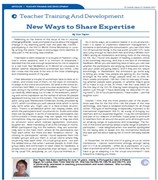New Ways to Share Expertise by Zoe Taylor
 Reflecting on the theme of this issue of the IH Journal, changing worlds, I was prompted to write about the biggest change in my teaching world over the past few months – participating in the first IH World Online Workshop in June. By writing this piece I hope to encourage more teachers to take part in this exciting new initiative.
Reflecting on the theme of this issue of the IH Journal, changing worlds, I was prompted to write about the biggest change in my teaching world over the past few months – participating in the first IH World Online Workshop in June. By writing this piece I hope to encourage more teachers to take part in this exciting new initiative.
I had been a silent observer in a couple of Pearson Longman's online sessions, and in a moment of braveness I decided that this was enough experience for me to respond to a call from Neil McMahon at IH World for volunteers to deliver teacher developments workshops live online. Little did I know that this was to be one of the most challenging and interesting events of my year.
I had delivered a couple of workshops face-to-face at IH Lisbon, and chose one of them, on the topic of intonation, to adapt to the online environment. So what is the online environment like? Well, it is quite a surreal experience. There I was, sitting in my kitchen with a headset on (with my washing up carefully tidied away out of view of the webcam), watching with some trepidation as the names of almost 20 people appeared one by one on the screen. The online platform we were using was Blackboard Collaorate (kindly provided by OUP), which furnishes you with several tools which in some way echo what you might use in a face-to-face environment. There's a whiteboard which can display slides, and which the participants and I could write on. Audio and video clips can be played. In terms of interaction, participants can communicate in three ways: they can speak into their own microphone, they can type into a chat box, or they can click on emoticon icons which indicate agreement, confusion, laughter etc . Most interesting of all is the concept of rooms. When participants log into the session, they are automatically sent to the main room, where all the participants can hear each other. But there are also “breakout rooms” - by clicking on participants' names I could separate them into smaller groups and put them in virtual rooms where they could only hear each other. It's virtual group work – but with the added bonus that when I wanted people to finish their group tasks and come back to open class for feedback, a simple click on an icon would whisk them all back – no need for my usual “OK, everybody, er, um, if you've finished, er...”
So in some ways, as a session leader in a virtual environment it is easier to implement classroom management. If someone is dominating the conversation, you can click their mic off (would be handy in the real world, wouldn't it?). I was also lucky enough to have both Neil and Shaun Wilden from IHWO acting as moderators and doing most of the clicking for me. But I found one aspect of leading a session online to be extremely daunting, and that is the lack of immediate feedback. When you are teaching face to face, you can see whether the participants are enjoying themselves (and how well your jokes are going down), and if they are not, adjust accordingly. In Blackboard, the emoticons go some way to letting you know how people are getting on, but frankly, amongst all the other things, people tend not to click on them unless prompted. I felt like I had no real way of knowing whether people were gripped, or whether they'd gone off to make a cup of tea. At times I felt like I was back on the first day of my CELTA (having heart-stopping moments where I just though “I have absolutely no idea what I'm doing here!”). So to future participants, I have a plea – use that laughter icon!
Overall, I think that the most positive part of the experience was that for the first time I felt the power of this new technology, and have a renewed enthusiasm for all things online. This type of technology is especially important to an international organisation like IH, as a way of bringing our teachers and our expertise together. I truly felt connected to and part of our network of schools. It was great to work with IH teachers from all around the world, who all brought such an amazing range of experience and knowledge. The format of the online workshop allows a wide range of people to participate – I was delighted when one teacher apologised for not being able to speak into the microphone because she was worried about waking her 3 month old baby beside her!
In November, for the first time IH is going to run an online conference. I cannot recommend strongly enough taking part in it if at all possible – either as a participant, or if you have a workshop which you've done face to face, why not have a go at adapting it to the virtual environment? I look forward to meeting you there.
